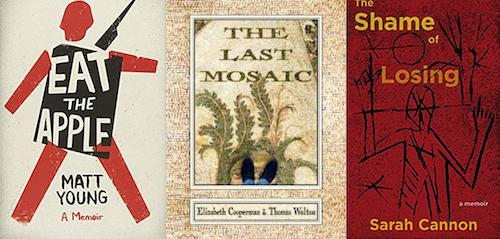These are the nonfiction books that moved me the most this year
I can't make you a list of Best Books that have been published in 2018 because I haven't read all of the books published in 2018. What I can do is reflect on the books I have read this year and let you know which of them has stayed with me — which books I'm still, weeks or months later, thinking about. To me, a book's longevity is its most important quality. I can read the most beautiful sentence in the world, but if that sentence doesn't set some chain reaction off in my mind, it's basically worthless. This week, I'm going to examine the books that really made a mark on me in one way or another — the books that changed me, the books that still live with me, the books that affect the way that I interact with the world. Perhaps you disagree, or perhaps you think some other book is way better than my selection. That's fine; send me an email or tweet at me and we can talk.

Every month at the Reading Through It Book Club, we talk about a non-fiction book that relates to Donald Trump's presidency in some way. In the two years we've been meeting, we've discussed race and immigration and Russia and too many other topics to list here. I consider it my primary source of non-fiction reading choices, and more often than not I learn a great deal from the books.
The two best books we discussed at this year's Reading Through It book clubs were Yuval Harari's Sapiens and Amy Goldstein's *Janesville: An American Story. One was a sweeping study of what it means to be human, and what we can expect for the future of our species, and the other was a patient and detailed examination of what it means to live in small town America today. If you're looking for a book to help you understand what's happening in the country as presidential candidates fight for your limited attention in the year to come, you could do worse than read either — or both! — of these books.
One book that we haven't read yet because it's in hardcover but that I hope to read in Reading Through It soon is Ijeoma Oluo's So You Want to Talk About Race, a serious investigation of the discussions we have when we talk about race in America. Oluo, a Seattle author, is a thoughtful and warm guide through conversations that many white Americans might not be comfortable having.
The non-fiction that most captured my imagination this year was memoir — it seems that the autobiographical narratives are the latest genre to enjoy a spirit of reinvention. Three local writers published memoirs (or memoir-like books) that changed my preconceptions of what the form can do.
[Sarah Cannon's The Shame of Losing(http://www.seattlereviewofbooks.com/reviews/accidentally-honest/), for instance, is a bracingly honest account of what happened when Cannon's husband suffered a brain injury that permanently changed the person he is. Despite taking the form of a traditional memoir, Losing felt daring and new thanks to Cannon's brutal self-assessments.
Eat the Apple by Matt Young is a memoir about Young's time in the military as told in a series of fragments: the story is told in a kaleidoscope of perspectives and sensibilities. Young is a born storyteller who understands that the shortest distance between two points — in this case a reader and understanding — is never a short line.
The Last Mosaic by Elizabeth Cooperman and Thomas Walton is more than fragmented — it's a literary mosaic, fashioned of tiny observations from a trip to Rome. It's a travel journal that's been sliced up and pasted back together in a thoughtful way — in fact, it feels like the only way these pieces could fit together. Like a good mosaic brings something new from disparate pieces, you can't see the original shape of the story in The Last Mosaic — only what the authors want you to see.